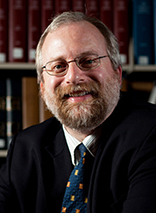University of St. Thomas School of Law professors Gregory Sisk, Thomas Berg, Teresa Collett and Michael Paulsen have filed amicus briefs in support of cases before the Supreme Court of the United States.
Hernandez v. Mesa
Represented by the law firm of Wilmer Cutler Pickering Hale & Dorr, in August professor Gregory Sisk submitted a “friend of the court” brief in Hernández v. Mesa. The case raises the question of whether a United States border patrol agent may be held responsible for shooting and killing a Mexican teenager (Hernández) on Mexican soil at the U.S. border in 2010.
The initial lawsuit filed by Hernández’s parents in 2014 alleged a violation of his Fourth and Fifth Amendment rights. The case made its way through the courts until the U.S. Supreme Court heard it in 2016 and ultimately decided to remand the case back to the U.S. Court of Appeals for the Fifth Circuit. The appellate court decided that there was no violation of the teen’s rights and that his parents were not entitled to a remedy under Bivens v. Six Unknown Named Agents, 403 U.S. 388.

Gregory Sisk
In 2018, on behalf of the teenager’s parents, lawyers again asked the Supreme Court to consider the case. The petition was granted and the case is set to be argued before the Court in November, 2019.
In the brief filed earlier this month by Sisk in support of the petitioners, he explains that a constitutional tort claim against the U.S. government and the border patrol agent is the only possible remedy for the child’s survivors in this case.
The U.S. government is immune from liability, however, because of the “foreign country” exception to the Federal Tort Claims Act. The individual officer is also immune from liability under state tort law through the federal Westfall Act because he was acting within the scope of his duty. Thus, Sisk’s amicus brief argues, the exception to Bivens when there is another adequate remedy under non-constitutional law simply does not apply here and would not prevent the court from recognizing the Fourth Amendment claim against the officer.
The brief concludes: “The iron-clad prohibition against arbitrary killing by agents of the state is what separates a democratic republic from pure tyranny. The Hernández family’s teenage son was shot to death by a federal agent. Their need for a right of action here could not be more urgent, more just, or more consistent with the basic logic of Bivens.”
Sisk is a professor of law and the Pio Cardinal Laghi Distinguished Chair in Law at St. Thomas.
Employment Division v. Smith

Teresa Collett
Berg, Collett and Paulsen are among a group of 10 religious liberty scholars from across the country to file an amicus brief supporting a certiorari petition before the Supreme Court.
The petition asks the court to review Ricks v. Idaho Board of Contractors. It was filed by the Becket Fund, a Washington-based religious freedom legal nonprofit that represents the petitioner in the case, George Ricks.
Ricks attempted to register with the State of Idaho to become an independent construction contractor, a process that requires individuals to provide their social security number. He refused, citing his religious beliefs against the practice and arguing that there were other ways for the state to verify his identity. Ricks eventually filed suit; however, the Idaho courts rejected his religious freedom claims.

Thomas Berg
The certiorari petition filed by the Becket Fund asks the U.S. Supreme Court to review the case and to overrule its 1990 decision in Employment Division v. Smith. Smith held that no person can raise a religious-freedom objection against a “neutral and generally applicable law,” even if the state interest behind the law is minimal and the state can achieve it in other ways. The Idaho courts relied on Smith in ruling against Ricks.

Michael Paulsen
Smith has been controversial since it was decided. It has been the basis for rejecting many claims of minority religions, including Native American, Hmong, Jewish and small Christian groups, among others. In support of the petition, the scholars’ amicus brief argues that Smith undermines the Free Exercise Clause purpose of protecting religious liberty and unfamiliar minority religions, and that it is inconsistent with the original meaning of the clause.
A team of attorneys from the law firm Gibson Dunn in Washington, D.C. drafted and filed the amicus brief on behalf of the 10 law professors and religious liberty experts, which included Berg, Collett and Paulsen.
Berg is the James L. Oberstar Professor of Law and Public Policy at St. Thomas and director of the law school’s Religious Liberty Clinic. Collett is a professor of law at St. Thomas and director of the school's Prolife Center. She also leads St. Thomas Law's Catholic Social Thought and the United Nations Clinic. Paulsen is a Distinguished University Chair and professor of law at St. Thomas. He is also among the nation’s leading scholars of constitutional interpretation.







